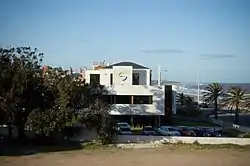 | |
| Founded | 22 August 1999 |
|---|---|
| Type | Nonprofit corporation |
| Legal status | Active |
| Focus | Allocation and registration of IP address space |
| Location | |
Area served | List
|
| Website | www |

LACNIC[1] (Latin America and Caribbean Network Information Centre; Spanish: Registro de Direcciones de Internet para América Latina y Caribe, Brazilian Portuguese: Registro de Endereçamento da Internet para América Latina e Caribe) is the regional Internet registry for the Latin American and Caribbean regions.
LACNIC[2] provides number resource allocation and registration services that support the global operation of the Internet. It is a not-for-profit, membership-based organisation whose members include Internet Service Providers, and similar organisations.
Functions
LACNIC's main functions are:
- Allocating IPv4 and IPv6 address space, and Autonomous System Numbers
- Maintaining the public Whois Database for the Latin American and Caribbean region
- Reverse DNS delegations
- Representing the interests of the Latin American and Caribbean Internet community on the global stage
Formation
Since 1993, academic organizations in Latin America like ENRED – Foro de Redes de América Latina y el Caribe, discussed the need of a register for Latin America, independent from the influence of the United States. In 1998 during an ENRED meeting in Panama including NIC-MX, this theme was discussed and they learned that another group formed by commercial organizations like CABASE (Cámara Argentina de Base de Datos y Servicio en Línea) and ECOM-LAC (Latin America and Caribbean Federation for Internet and Electronic Commerce), were also discussing the idea of a Latin American registry.[3]
On January 30, 1998, Ira Magaziner, then the senior adviser to President Clinton for policy development, released a discussion paper, known as the "green paper" after the DNS root authority incident. A revised version known as the "white paper" was released on June 5.[4] This paper proposed a new organization to handle internet resources (that later became ICANN). The International Forum for the White Paper organized four meetings, the final one in Buenos Aires was attended by South American communication organizations.
Those organizations joined by ECOM-LAC, argued that Latin American IPs addresses could be handled by a local entity and the agreement for creation of LACNIC was signed in Santiago, Chile, on August 22, 1999, during the second ICANN meeting.
An Interim Board was defined with six members:
- AHCIET (Ibero American Association of Research Centers and Telecommunication Companies), Raimundo Beca
- CABASE (Argentine Chamber of Databases and Online Services), Jorge Plano, later substituted by Oscar Messano
- CGI.br, José Luis Ribeiro
- ENRED (Network Forum for Latin America and the Caribbean), Julian Dunayerich; later substituted by Raul Echeverria
- NIC.mx (NIC Mexico), German Valdez
- ECOM-LAC, Fabio Marinho
The agreement to form LACNIC was submitted on August 26, 1999, to Esther Dyson, then Chair of ICANN Interim Board, and the business plan was presented to ARIN. Statutes were created and it was decided that LACNIC headquarters would be in Montevideo, with technicians and equipment in São Paulo, at the NIC.br premises.LACNIC was established in 2001, with administrative offices in Montevideo, Uruguay, and technical facilities provided by CGI.br[5] of São Paulo. The criteria[6] for a new regional Internet registry was formally recognized by ICANN during its Shanghai meeting in 2002.[7]
Initiatives
Countries - LACNIC region
Membership
Today, LACNIC has a total of over 8,500 members in the following categories:
- Active Founding Members: AHCIET, CABASE, CGI-Br, eCOMLAC, ENRED, NIC-Mx
- Active A Members
- Those who receive IP address space directly from LACNIC or indirectly through national registries NIC Brazil and NIC Mexico, as well as those who have received address space from ARIN corresponding to the address space allocated to LACNIC and who apply for admission.
- Adhering Members:
- Organizations based in the LAC region or that carry out their activities mainly in LAC, which are involved in Internet development and/or composed of Internet service providers, make a relevant contribution to Internet-related policies in the region, agree with the goals of LACNIC and apply for admission.
- Organizations that manage IP addresses that are not part of the address space allocated to LAC and are geographically located in the LAC region.
- Any person, company or institution designated as such by decision of the LACNIC Member Assembly in recognition of their activities in furtherance of LACNIC's goals.
- Any natural or legal person who makes a significant financial contribution to support LACNIC.
- Organizations that receive only an ASN do not become LACNIC members.
The Number Resource Organization
With the other RIRs, LACNIC is a member of the Number Resource Organization (NRO), which exists to protect the unallocated number resource pool, to promote and protect the bottom-up policy development process, and to be the focal point for input into the RIR system.
References
- ↑ "Memorandum of Understanding between LACNIC (the Latin America and Caribbean Network Information Centre, referred to here as "LACNIC") and Internet Systems Consortium, Inc. (referred to here as "ISC")" (PDF). lacnic.net. 1 April 2004. Archived from the original (PDF) on 6 October 2010. Retrieved 18 September 2010.
- ↑ "LACNIC´s Board of Directors Elections". lacnic.net. Retrieved 7 October 2010.
- ↑ Aguerre, Carolina (15 April 2019). "El desarrollo de la Comunidad de LACNIC Una historia en construcción" [The development of the Latin American Community A history under construction] (PDF). LACNIC (in Spanish). p. 46. Archived from the original (pdf) on 20 July 2019. Retrieved 19 July 2019.
El VIII Foro de Redes de ENRED, realizado en noviembre en Panamá, sirvió de punto de encuentro formal y explícito con NIC.BR, el segundo registro nacional de la región, que operaba la mitad de los recursos IP utilizados en toda América Latina.
- ↑ "Statement of Policy on the Management of Internet Names and Addresses | NTIA". www.ntia.doc.gov. Retrieved 2016-02-17.
- ↑ "Inicio do processo eleitoral do CGI.br" (in Portuguese). CG.org.br. Retrieved 7 October 2010.
- ↑ "ICANN ICP-2 criteria".
- ↑ "Regular Meeting of the Board Minutes". ICANN. 31 October 2002. Retrieved 7 October 2010.
- ↑ "Programa FRIDA | About FRIDA". Programa FRIDA. Retrieved 2021-03-01.
- ↑ "Applications open for US$25,000 LACNIC Programa FRIDA fund". Retrieved 2021-03-01.
- ↑ "LACNIC, Google to headline 'Internet Week Trinidad and Tobago' in October". Curaçao Chronicle. 2018-09-14. Retrieved 2021-03-01.
- ↑ "LACNIC CSIRT | Amparo Workshop". LACNIC CSIRT. Retrieved 2021-03-01.